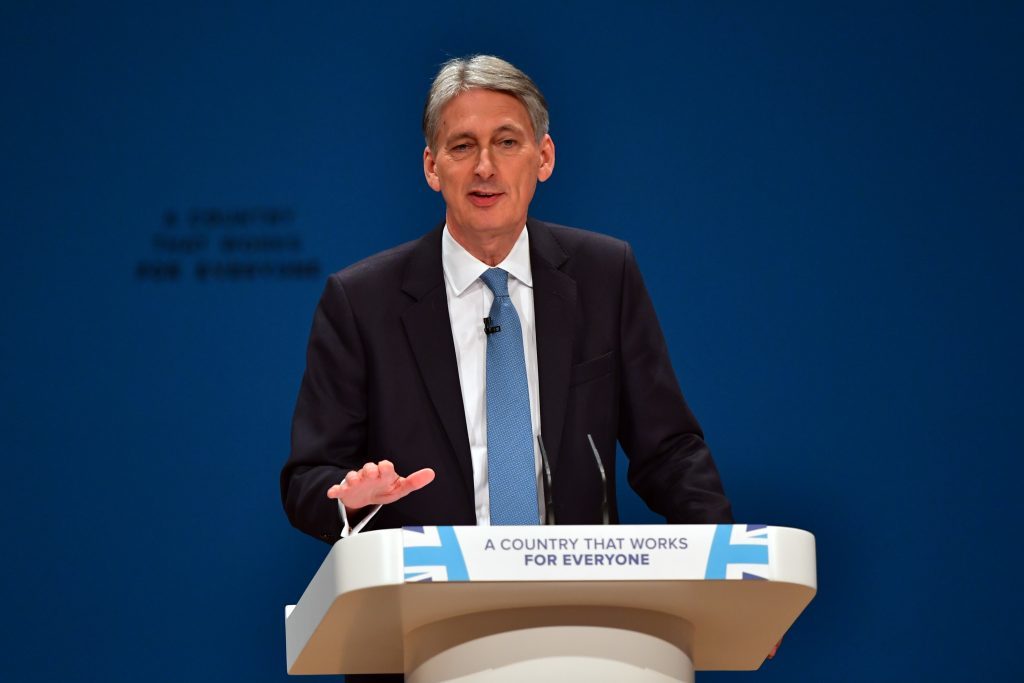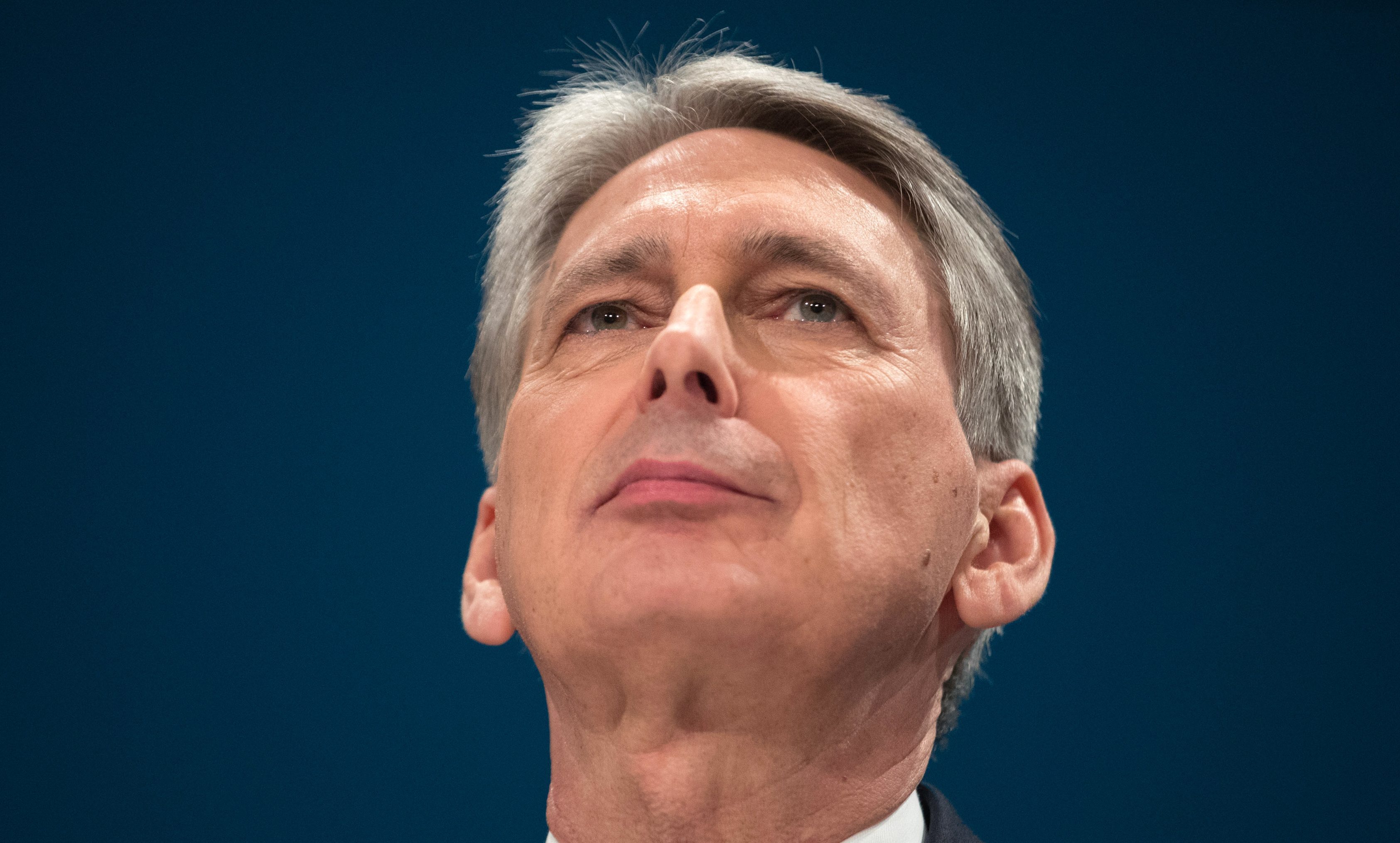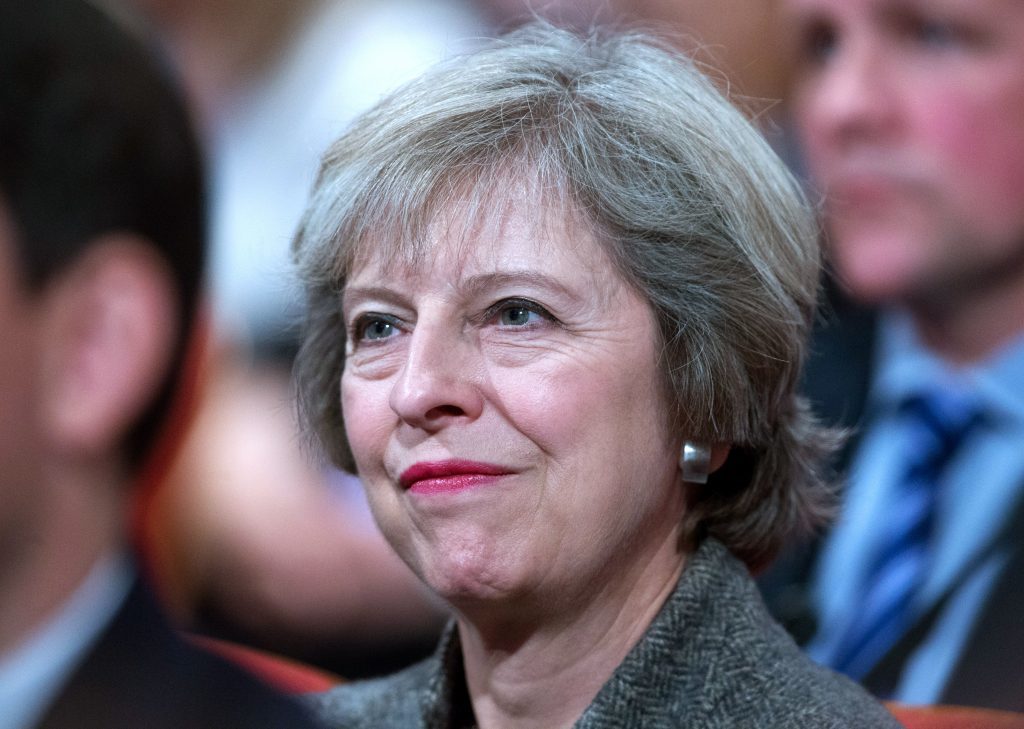Chancellor Philip Hammond has unveiled a set of policies designed to shore up Britain’s economy during a period of “turbulence” which he has forecast as a result of Brexit.
Speaking to the Conservative conference in Birmingham, Mr Hammond offered a new guarantee to continue payments of any multi-year EU grants secured by British businesses and organisations before withdrawal – probably in March 2019.
And he announced £220 million of new funding for the tech sector to support efforts to transform biomedical and computer innovations into marketable products.
Mr Hammond warned that the UK economy faces a “rollercoaster” ride over the coming two years as the UK negotiates a new relationship with its EU partners.
But he said he was ready to take “whatever steps are necessary to protect this economy from turbulence”.
And he hinted that this could include tax cuts to stimulate economic activity, telling delegates that “fiscal policy may also have a role to play” alongside interest rate reductions to boost confidence.
Mr Hammond said that action was needed to boost productivity, invest in infrastructure and tackle the “dangerous” gap between London and the “left behind” regions of the UK, in order to ensure that withdrawal from the European Union is not “the end of an era”, but “the beginning of a new age” for Britain.
Mr Hammond’s announcement extends for a further two years or more an earlier promise that the Treasury would guarantee funding for EU-backed deals signed by universities and businesses before next month’s Autumn Statement.
The Treasury said that the promise would apply to all structural and investment funds, including agri-environment schemes, so long as they provide “strong” value for money and are in line with domestic strategic priorities.
The pledge is intended to give hundreds of businesses and universities the confidence to continue bidding for competitive EU funds while the UK remains a member.

Mr Hammond said: “I can offer some additional certainty to British businesses and other organisations bidding to receive EU funding while we’re still a member.
“I’ve already guaranteed the funding for projects signed prior to this year’s Autumn Statement.
“Today, I can go further. The Treasury will offer a guarantee to bidders whose projects meet UK priorities and value for money criteria, that if they secure multi-year EU funding before we exit, we will guarantee those payments after Britain has left the EU.”
Mr Hammond’s speech confirmed that he has torn up predecessor George Osborne’s plan to get Britain’s finances into surplus by 2019/20.
The move allows the Government more flexibility to borrow to invest in infrastructure projects – including a new £2 billion Accelerated Construction scheme announced by Communities Secretary Sajid Javid to speed up housebuilding.
But the Chancellor insisted it did not mean an end to spending discipline, saying that public spending would continue to be controlled to keep the UK on the path towards balancing the books.
Mr Hammond said that the Treasury was also “ready to provide support to British businesses as they adjust to life outside the EU” once the two-year process of negotiations under Article 50 of the EU treaties is completed.
Treasury sources declined to say whether this could include the compensation demanded by Nissan for any additional tariffs it is required to pay as a result of Brexit. But a spokeswoman said that companies such as the Japanese car manufacturer may find the Chancellor’s comment “reassuring”.
Sources close to the Chancellor said his speech reflected his conviction that, while the June 23 referendum was a vote to take back sovereignty, it was not a vote to sink the economy. While respecting the mandate for EU withdrawal handed down by voters, he wanted to ensure that it was done in a way which delivered long-term, sustainable economic growth.
Mr Hammond said that this would require action to ensure the economy remains “outward-looking, dynamic (and) competitive” and that the UK is able to continue attracting the brightest and best from around the world to work in Britain.
Closing the productivity gap which sees UK workers work longer to produce less than their counterparts in the US, Germany, France and Italy would be “key to Britain’s future outside the UK”, he said. With a 1% improvement in productivity each year worth £250 billion to the economy in a decade, he promised action to close the gap, with measures to improve skills, invest in infrastructure and devolve powers to the regions.
Restating Treasury support for Mr Osborne’s Northern Powerhouse and Midlands Engine programmes, Mr Hammond warned: “One of the key messages of the referendum campaign was that large parts of our country feel left behind. They see the country getting richer, but don’t feel part of that success.
“A dangerous divide is opening up between those who believe they have a stake in the success of our economy and those who do not.
“It is one of the central missions of this Government to tackle that divide, to see the benefits of economic growth shared more evenly across the regions, and across the generations.”
The Chancellor told the conference: “Our economic future must not be defined by Brexit alone.
“So as we tread the path to becoming an independent, sovereign country once again and forge a new and exciting role for our nation in the world, let us resolve to tackle the challenges we face at home with renewed vigour: dealing with the deficit; raising our productivity; rebalancing our economy; rebuilding our infrastructure; and ensuring that everyone, in every part of our country, can contribute to, and benefit from, the growth that follows.”




